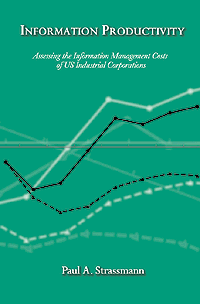Information Productivity
Assessing the Information Management Costs
of U.S. Industrial Corporations
by Paul A. Strassmann
Search within entire book online using Google Print
``Very readable, holds attention from front to back. Excellent content, thought provoking, clearly well researched and obviously considerable original intellectual input. This is, however, a statisticians dream. This is like a highly refined diagnostic tool for a disease for which the cure appears elusive...
I believe this is a seminal work. It contains much research that will provide valuable input into corporate improvement.''
- russells@atio.co.za, July 15, 1999
An examination of how the costs of information management relate to all other costs of doing business offer valuable insights into the "information economy." During the last ten years, U.S. industrial corporations:
- Lowered the costs of information management required to deliver goods and to customers;
- Increased per employee information management costs faster than employee compensation;
- Lowered information management costs in support of revenues;
- Lowered the ratio of information management costs to operating profits;
- Lowered the ratio of information management costs to net assets in place;
- Improved Information Productivity since 1991, but only on account of more favorable interest rates and not from measurable gains that are attributable to information technology investments.
While these changes were taking place the U.S. industrial corporations also showed the following characteristics:
- Ninety-two percent of firms incurred higher expenses for information management than for the costs of ownership of their net capital assets. This makes the utility of asset-based productivity ratios (such as ROA, ROI or ROE) questionable as a measure of performance;
- Forty-two percent of firms delivered negative economic value-added (EVA). This makes accounting profits questionable as a measure of operating results.
- There was no relationship between the costs of information management and profitability;
- There was no relationship between the costs of information technology and profitability;
- The costs of information management remained concentrated in a few large corporations;
Though U.S. industrial corporations have recently shown an improvement in the information management metrics, the record of actual accomplishment still falls far short of its potential. When one examines the enormous disparity between the top ranking U.S. industrial firms (in terms of Information Productivity) and the bottom laggards one finds that a large percentage of organizations are not productive. The bottom ranking firms spend huge sums on information management that does not deliver economic value-added. That acts as drag on further progress of the entire economy. The U.S. industrial corporations are not even close to achieving what is possible by getting information resources managed with greater effectiveness. It now becomes the task of information management to establish the further improvement in Information Productivity as one of the key goals of corporate executives.
The book includes the Information Productivity© rankings of 1,586 U.S. industrial corporations, including key productivity indicators that can be applied to benchmarking. Also included is a selected listing of the 400 top productivity ranking firms, arranged by industry.
- Review by Sandy Reed, Editor-in-Chief, InfoWorld
- Review by
William Sheridan, Editor, InSite
- Excerpt in Computerworld: "The Search for Productivity"
Mr. Strassmann is the CEO and Chairman of the Software Testing Assurance Corporation and Chairman of the Board of The Information Economics Press and Method Software. He is adjunct Professor in the Systems Engineering Department at West Point. Strassmann is member of the Advisory Boards to Sun Microelectronics Laboratories and the Syracuse University and serves on the Board of Directors of McCabe Systems, Protegrity Systems and Meta Software corporations. Strassmann has authored over 200 articles and five books about the management of information technologies and holds Registered U.S. Trademarks for Return-on-Management®, Information Productivity® and Knowledge Capital®.
His consulting includes engagements for senior executives of AT&T, Citicorp, Digital Equipment, General Electric, General Motors, IBM, Shell Oil and Texas Instruments. Strassmann served on the Army Science Board and the Defense Science Board and is life member of the Data Processing Management Association, fellow of the British Computer Society, and senior member of the Institute of Electrical and Electronic Engineers. He authored the code of conduct for data processing professionals; was recipient of the 1992 Award for Achievement by the Association for Federal Information Resource Management; the 1992 International Industry Award for advancing the adoption of Open Systems; the 1996 Excellence Award for Business Engineering and the 1997 Recognition by the CIO Magazine as one of the twelve most influential Chief Information Officers of the last decade. He is recipient of the Defense Medal for Distinguished Public Service - Defense Department's highest civilian award.

Now Available!